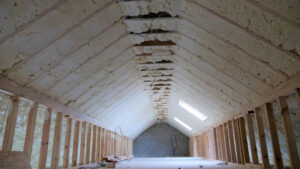Open-Cell Spray Foam Insulation
Open-cell Spray Foam insulation absorbs sound and protects against air leaks. In addition, this insulation can reduce energy costs by 45% or more. Best Spray Foam Insulation outperforms 99% of stick-built homes with fiberglass batt insulation. 
Open-cell spray foam insulation is made from a unique polymer that allows air to pass through it. The air that is present in the material can absorb sound and heat. Because of its open-cell structure, open-cell foam works best at absorbing mid and high-frequency sounds. The open-cell foam can also be more cost-effective since it uses less plastic, and the air within it acts as an effective insulator.
Sound absorption is measured using the NRC, a single number that ranges from 0 to 1. The higher the number, the better the soundproofing. For example, an NRC of 0.75 means that seventy-five percent of sound is absorbed. This is excellent sound-proofing quality for a variety of building types, including houses and apartments.
Open-cell spray foam insulation is a good option if you want to reduce noise in your home. It has the advantage of being a more effective soundproofing solution than Rockwool. The open-cell foam does not settle over time, which means that it will not create openings in the walls that can allow sound to penetrate.
The open-cell type of spray foam insulation is the most effective at absorbing sound. This type of foam is made of a chemical called MDI. This chemical is mixed with other ingredients and sprayed into the cavities of the wall. Once sprayed, the material hardens into a block that prevents air from flowing through. It also absorbs sound waves, resulting in a quieter room.
Open Cell Spray Foam is excellent multi-purpose spray foam. It is non-flammable and has been tested to meet the ASTM E84 requirements for sound deadening. It has an R-value of 3.6/inches and is semi-permeable to water. It has a density of half a pound per square foot and tensile strength of four pounds.
Open-cell spray foam insulation is a low-cost option for sound-deadening. Its low density and high expansion properties make it a more affordable alternative to traditional construction methods. It also helps reduce energy bills by up to 50%.
Air leakage is one of the biggest sources of energy loss in a building. Using spray foam insulation protects against this problem by creating an air-tight seal. This will lower your energy bill and increase your home’s comfort. In addition, it will also improve your home’s value.
Air leakage can cause up to 40 percent of a building’s energy loss. Air leakages can lead to high energy bills and wasted resources. By sealing off air leaks, spray foam will increase your home’s R-value and improve its energy efficiency. It will also help keep your interior climate comfortable year-round.
Air leakage can be caused by a variety of reasons. In some cases, it’s because of a poorly designed structure. Other times, the structure isn’t airtight, or it has poorly-insulated walls. Either way, it’s not a good idea to rely solely on air leakage to regulate your home’s climate.
Open cell spray foam is a great way to protect against air leakage in your home. This type of insulation doesn’t absorb water or support the growth of mold. It’s also effective in dampening sound. It’s also a good choice for homes in cold climates, where winters are bitterly cold.
Spray foam can be applied to open cavities in the house, including attics and crawl spaces. It can also be used to fill voids and cracks in existing buildings, including commercial structures and pole barns. As a result, spray foam doesn’t compress or sag and can fill cracks and gaps.
As with other types of insulation, spray foam is effective at preventing air leakage and reducing drafts. It also resists the growth of mold and other harmful gases. Moreover, it has superior air sealing properties, making it a great choice for sealing gaps and preventing air leakage.
Open cell spray foam is a low-density product that is sprayed into open cavities. Open cell spray foam is not ideal for homes but is more suitable for structures that have little space. Closed cell spray foam is a high-density form of foam that is highly stable. It is also good for attics and confined spaces and is water-resistant.
